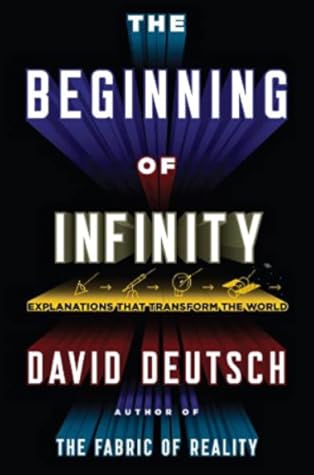More on this book
Community
Kindle Notes & Highlights
Read between
February 16 - March 4, 2019
within the range of our best telescopes, which can see more galaxies than there are stars in our galaxy,
Fallibilists expect even their best and most fundamental explanations to contain misconceptions in addition to truth, and so they are predisposed to try to change them for the better.
We never know any data before interpreting it through theories.
tradition of criticism.
scientific theory must be testable
although scientific theories are not derived from experience, they can be tested by experience
by observation or experiment.
Popper
I think that there is only one way to science – or to philosophy, for that matter:
to meet a problem, to see its beauty and fall in love with it; to get married to it and to live with it happily, till death do ye part – unless you should meet another and even more fascinating pro...
This highlight has been truncated due to consecutive passage length restrictions.
But even if you do obtain a solut...
This highlight has been truncated due to consecutive passage length restrictions.
then discover, to your delight, the existence of a whole family of enchanting, though perhaps ...
This highlight has been truncated due to consecutive passage length restrictions.
the crucial ‘data’ cannot even be obtained until theory tells us what to look for and how and why.
whenever it is easy to vary an explanation without changing its predictions, one could just as easily vary it to make different predictions if they were needed.
need for a tradition of criticism.
criterion for reality
particular thing is real if and only if it figures in our best expl...
This highlight has been truncated due to consecutive passage length restrictions.
values entailed by the quest for good explanations, such as tolerance of dissent, openness to change, distrust of dogmatism and authority, and the aspiration to progress
The principle of optimism All evils are caused by insufficient knowledge.
Wealth The repertoire of physical transformations that one is capable of causing.
An optimistic civilization is open and not afraid to innovate, and is based on traditions of criticism.
the most important knowledge that they embody is knowledge of how to detect and eliminate errors.
you honour Athenians for our openness to persuasion. And for our defiance of bullies.
How many are willing to criticize a god by the standards of reason and justice?
namely by refusing to hold any of our ideas immune from criticism
Yet our values include being open to suggestions, tolerant of dissent, and critical of both dissent and received opinion.
through our tradition of endless critical
debate, we have discovered some genuine knowledge.
it is wrong of the Spartans to educate their children to hold their city’s ideas, laws and customs immune from criticism.
the moral imperative not to destroy the means of correcting mistakes is the only moral imperative? That all other moral truths follow from it?
What matters in all cases is the explanation you create, within your own mind, for the facts, and for the observations and advice in question.
knowledge originates from the same source as dreams? Which is within ourselves?
the sensation of touching an object does not happen where we experience it happening, namely in the hand that touches, but in the mind – which I believe is located somewhere in the brain. So all my sensations of touch are located inside my skull, where in reality nothing can touch while I still live.
And whenever I think I am seeing a vast, brilliantly illuminated landscape,
all that I am really experiencing is likewise located entirely inside my skull, where in rea...
This highlight has been truncated due to consecutive passage length restrictions.
waking dream that corresponds to reality.
is a dream of which you then gain control.
myself – the thinking being that I call ‘I’ – has no direct knowledge of the physical world at all, but can only receive arcane hints of it through flickers and shadows that happen to impinge on my eyes and other senses? And that what I experience as reality is never more than a waking dream, composed of conjectures originating from within myself?
Here we sit, for ever imprisoned in the dark, almost-sealed cave of our skull, guessing. We weave stories of an outside world – worlds, actually: a physical world, a moral world, a world of abstract geometrical shapes, and so on – but we are not satisfied with merely weaving, nor with mere stories. We want true explanations. So we seek explanations that remain robust when we test them against those flickers and shadows, and against each other, and
against criteria of logic and reasonableness and everything else we can think of. And when we can change them no more, we have understood some objective truth. And, as if that were not enough, what we understand we then control. It is like magic, only real. We are like gods!
there is no upper bound to how much we can eventually understand, and control, and achieve?
Interestingly, he mainly did this by asking me questions, and inviting me to think about certain things. It seems an effective technique
we habitually underestimate the difficulty of communication
communication of new ideas – even mundane ones like directions – depends on guesswork on the part of both the recipient and the communicator, and is inherently fallible.
misunderstandings are ubiquitous and that neither intelligence nor the intention to be accurate is any guarantee against them.
Evidence, argument and explanation
The way to converge with each other is to converge upon the truth.
Quantum theory is the deepest explanation known to science.
this seemingly alien territory is the reality of which we and everything we experience are part.
the ‘many-universes interpretation’ of quantum theory (rather inadequately, since there is much more to it than ‘universes’) – remains at the time of writing a decidedly minority view among physicists.


